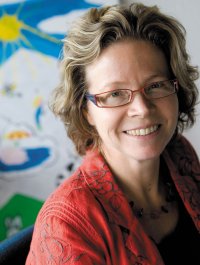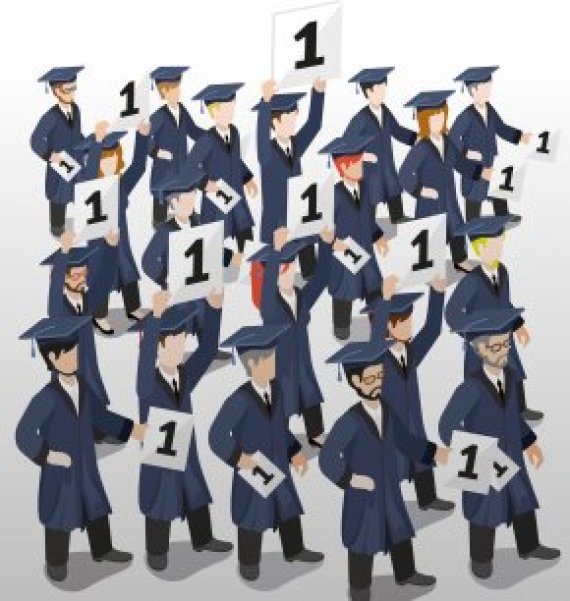Every six years about 60 foreign researchers descend on Wageningen to assess the quality of research here. In advance of their visit they receive a big packet of paper from the graduate school and the chair groups in question – their self-evaluations – and they spend their four-day visit talking to research directors, full professors, academic staff and PhD candidates. Then they make recommendations to the schools and assess the chair groups on their research quality, relevance to society and viability. A high score boosts the professor’s standing and can help the group get new research proposals approved and funded. Low scores meanawkward questions from management and a lower position in the academic pecking order.
There are a couple of striking things about the latest evaluation. One is that this time 20 Wageningen research groups were considered excellent by their international colleagues. Six years ago only nine achieved that rating. At that time most of the excellent groups were either in the Experimental Plant Sciences (EPS) graduate school or in VLAG, the school for Food Technology, Agrobiotechnology, Nutrition and Health Sciences. This year there are excellent groups in almost all the graduate schools. Only the Wageningen Institute of Animal Sciences (WIAS) lacks a group rated excellent in all three areas.
HARD TO COMPARE
But that does not necessarily mean the WIAS is not doing as well as the other schools. It is hard to compare the assessments of the graduate schools. For one thing, the evaluation of the animal scientists was demonstrably more stringent than those of other graduate schools. The WIAS committee only awarded a 1 (excellent) if a research group was ‘one of the most infl uential research groups in the world in this specific field.’ ‘We believe other committees are less strict,’ writes committee chair Barbara Cannon in the report. The committee which assessed the EPS was severe too. During the oral presentation in June the committee chairexpressed his irritation at the late submission of the self-evaluation, which left the committee with too little time. So the EPS was 0-1 down before the grading even started.
HIGHFLYERS, CLIMBERS AND STRAGGLERS
 *We shouldn’t compare the chair groups with each other, but it is okay to compare them with themselves. So we compared their scores six years ago with the latest ones. Six top-scorers from six years ago have held their positions: Microbiology (Professor Willem de Vos)
*We shouldn’t compare the chair groups with each other, but it is okay to compare them with themselves. So we compared their scores six years ago with the latest ones. Six top-scorers from six years ago have held their positions: Microbiology (Professor Willem de Vos)
, Entomology (Marcel Dicke), Nematology (Jaap Bakker), Plant Pro- duction Systems (Ken Giller), Nutrition and Genomics (Sander Kersten) and Evolutionary Biology (Ben Scheres). And then there are 12 groups which have worked their way up to the top: Molecular Biology (Ton Bisseling), Forest Ecology (Frits Möhren), Nature Management (Frank Berendse), Food Technology (Harry Gruppen), Process Technology (Remko Boom), Organic Chemistry (Han Zuilhof), Physical Chemistry and Soft Matter (Jasper van der Gucht), Toxicology (Ivonne Rietjens), Education and Competence Studies (Martin Mulder), Operations Research and Logistics (Jack van der Vorst), Public Administration and Policy (Katrien Termeer) and Aquatic Ecology (Marten Scheffer). If we round up the half points in the WIMEK evaluation of 2014, then Environmental Policy (led until recently by Arthur Mol) and Environmental Microbiology (Fons Stams) join the highflyers. But who has made the greatest progress in the last six years? One candidate is the Farming Systems Ecology group (led by Pablo Titonell). Six years ago this group almost brought up the rear with a mere 3 for research quality and relevance. In the new list their scores have gone up across the board. Nobody, however, has risen as dramatically as the Public Administration group (Katrien Termeer). This group was among Wageningen’s lesser gods in 2009, and is now ranked among the excellent. And of course there are also groups that shine less brightly. Biosystematics is still bringing up the rear, as is Sociology of Households and Consumption (Hilde Bras) and Economics of Consumers and Households (Gerrit Antonides). Land use (Adri v/d Brink) gets lower scores than six years ago, and the groups working on Food Quality (Vincenzo Fogliano) and Information Technology (Bedir Tekinerdogan) are beset with teething or transition problems*.
WIMEK graduation school was already scored last year. The Peer Review committees used a different scoring system this time to the one they used six years ago. Then, a 5 was excellent, a 4 was very good, a 3 was good, a 2 was satisfactory and a 1 was unsatisfactory. In the new system, a 1 is excellent, 2 very good, 3 good and 4 unsatisfactory.
Other committees, by contrast, were in high spirits. ‘The food was great and this is the most exceptional graduate school we have ever seen,’ declared committee chair Volkmar Wolters, referring to the Production Ecology and Resource Conservation school (PE&RC). His committee was ‘pleasantly surprised’ by the high standards. Alan Irwin, who assessed the Wageningen School of Social Sciences (WASS), was ‘extremely impressed’ by the unique position of the social sciences in a life sciences university. ‘You are ahead of the game,’ he said. And that’s enough to give you a 1-0 headstart. Another striking difference is the degree of importance committees give to obtaining prestigious grants – Veni, Vidi and Vici grants from the NWO and ERC grants from the EU. While one committee may see this as a condition for academic excellence, another may not. This is because academic fields vary in how unusual it is to obtain such prestigious grants. For this reason the committees wanted to compare the Wageningen groups’ records with those of similar research groups in other countries. Using this benchmark makes it possible to assess just how exceptional a Nature publication or an ERC grant really is. It is precisely in this international comparison that many Wageningen groups stand out. And many groups have improved since six years ago. These groups took the advice of the previous peer review committee to heart and got their papers published in better journals.
The groups which had a low score last time have improved or disappeared
Johan van Arendonk
INFLATION
Johan van Arendonk, Dean of Science at the university, is very satisfied with the results. ‘Broadly speaking we have done a great job. The supervision of PhD candidates is outstanding and the academic staff are committed: all the committees noted this.’ What is more, observes Van Arendonk, many of the groups have worked hard to improve the quality. ‘The groups which had a low score last time have either improved or disappeared.’ You could, however, argue that there is a certain inflation at work in the evaluations. As many as 20 of Wageningen’s 90 groups are excellent. That might be logical, given Wageningen UR’s high scores in the international rankings, but it might be an exaggeration too. Groups which score a 2 on three counts fall in the ‘very good’ category, and form the majority. Not a single group is rated ‘unsatisfactory’ – a 4 – for quality or relevance, but from the commentary you can deduce that a 3 – officially ‘good’ – actually means cause for concern. Sometimes a 3 is a result of a change of professor, with a delay in the succession or a change of course – something committees are not fond of. But sometimes there is more to it than that: an outdated line of research, too small a group, too few publications or PhD students, or a lack of talent on tenure track. These are indications that in reality the designation ‘good’ is no longer good enough.
LESSONS
But regardless of whether a group is excellent, very good or just good, all the groups are offered suggestions for improvement by the committees. Bracketing those suggestions together, you can extract some general lessons for the university. Several of the committees point out that a relatively large proportion of the PhD candidates and postdocs appointed are Wageningen graduates. Is this ‘inbreeding’ justified, or do we ignore better, external candidates? Van Arendonk: ‘The question is whether we get the best PhD candidates and postdocs. To do that you need to recruit openly and do more than publish an advert.’ The committees also advise the chair groups to collaborate more in order to explore new fields and have more impact. And the PhD researchers must learn to position their research in a wider research and social context. Finally, the social relevance of Wageningen research could be further increased. Van Arendonk: ‘Many groups have wrestled with the question of how to draw attention to their social relevance. The committees say: it does not mean you have to do applied research. No, what you must do is fundamental research that is in tune with the wider society, because what is needed there is fundamental knowledge. So you must carry on investing in that.’
EXCELLENCE IN SIX YEARS
Six years ago, the Public Administration chair group was given a poor rating by the international Peer Review committee. This year it is deemed excellent. What is the secret? Professor Katrien Termeer explains.
‘The last time we were assessed we were only three years old. We had some research ideas but we didn’t have much to show for them. So we got a 3 for quality of research and for relevance to society. The group was disappointed for a few days but then the young researchers said, come on, next time we’ll be excellent. And that resolution has been achieved.

We started publishing more strategically, only in journals with a high impact factor. We managed to get published both in the key journals for public administration and in the interdisciplinary journals in the field of food and climate. So we started making a contribution in both worlds. We also made sure we set up our projects in dialogue with policymakers and the business world, so that relevance to society was built into the project.
It was crucial too that the group arrived at a shared theoretical narrative. Six years ago members of staff all had their own theories about public administration. Now we have a shared theoretical model showing the criteria which governance has to meet on the issues which we study. That is a tremendous help because we now work together on a shared narrative.’







